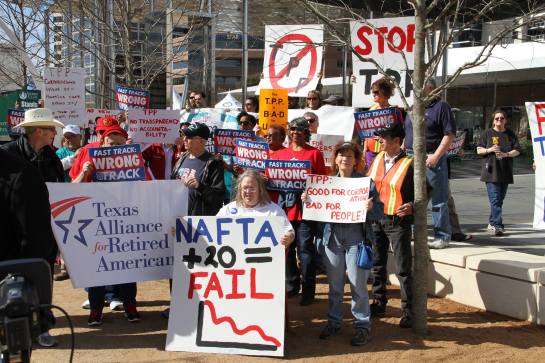The Future for Unions

Unions are doing so many things right nowadays that one hesitates to make any suggestions. I enjoyed a recent posting by the International President of the AFSCME (American Federation of State, County, and Municipal) union. He outlines some of the positive changes they have made.
I’d go so far as to say that the main labor federation, AFL-CIO, has made great strides since the “palace coup” changed the leadership in 1995. I love working with them.
Unions are inherently revolutionary, even though they do everything in their power to not be. They can’t help but oppose capitalism, even though they are solely defensive organizations, because capitalists can’t stop attacking them. Unions will never take power anywhere, but they can’t help trying.
But Unions Face Tremendous Problems
In my opinion, America’s unions could go a long way toward solving their problems if they’d just start with an historical analysis. As long as they continue to ignore the great mistakes they made between 1947 and 1995, they’ll find it harder to go forward. That’s one important thing.
Another one is that unions need to free themselves from being chained to the worst part of their members. Any union official can tell you that they spend most of their time handling petty grievances. The best union members rarely file a grievance, because they are not only the best union members but also the best workers. The worst workers, the ones who can’t show up half the time, the ones who are drunk on the job, the ones who abuse one another — those are the ones that file most of the grievances and , consequently, take up most of the union officers’ time.
In fact the biggest time consumer of all is the termination grievance. Somebody gets fired and the union feels obligated to try to get their job back. Management is not likely to take them back before all options are exhausted — and there are a lot of options in labor/management relations. The best union members, the best workers, rarely get fired.
That’s just the way the job works and nobody is actually complaining. If you don’t take care of the worst workers, you can’t take care of all the workers. If management can get away with abusing some workers, they’ll try to abuse all. So it’s not a waste of time, just a big consumer of time, to deal with grievances.
Union officers would like to spend time organizing, educating, and strengthening the union movement — but they usually don’t because they don’t have time.
There Are Tremendous Solutions
I believe that progressive union leaders are finding and applying solutions to these problems. I heard once that the Service Employees have some kind of centralized national grievance-handling process where grievances are called in by phone. I have no idea if this is true, nor do I know how it works.
But I imagine a big round table with grievance experts sitting at computers all around. Each of them has a headset. Each computer has access to labor law and, more importantly, every pertinent union contract. Members from all over the country call in their grievances. The expert types up a proper report and offers immediate advice. Then they contact management and begin to “handle” the grievance. They use three-way calling when appropriate.
When contracts expire, a complete digital record of the old contract and all grievance settlements is available to the negotiators. One of the experts from the round table I described might even sit in on negotiations to make sure everything is done properly and legally.
What Is Needed?
Unions need cooperation. The utopian grievance handling proposal I outlined above could be used by the AFL-CIO to handle ALL grievances, not just those of a single union. Or maybe we could have one “grievance center” for public workerfs and one for private workrers. Maybe another one for private workers under the Railway Labor Law, as opposed to the National Labor Relations Law.
Unions are cooperating now more than anytime since 1947. They are not only cooperating with one another, they are even merging with one another. That’s good, but it could go a whole lot further. They could, for example, centralize their organizing departments, their education departments, and maybe some other departments.
Unions need organizers. The best organizers nowadays work with entire communities. The union man standing in front of a plant handing out leaflets, they say, has already lost. People get organized from their homes and communities. I’d go further to say that the best union members are going to be organized through a series of meaningful activities like the “Fight for Fifteen” effort to raise the minimum wage.
The internet, and, especially, social media need to be harnessed in labor’s campaign. We can organize that way and we can educate that way. Unions need educators.
Unions need activists. Every time a union man or woman assists in a community problem, they advertise the importance of joining the union.
None of these ideas is exactly new, except insofar as new technology is applied. My own union, the Autoworkers, wasn’t organized in the plants. It was organized during the frequent periods of plant shut downs in the auto industry. It was organized by the great Unemployed Councils, by marches, rallies, and protests.
And that seems like a good place to stop because it brings me back to my original point: unions need to assess our own history and learn from it!
Leave a Reply
